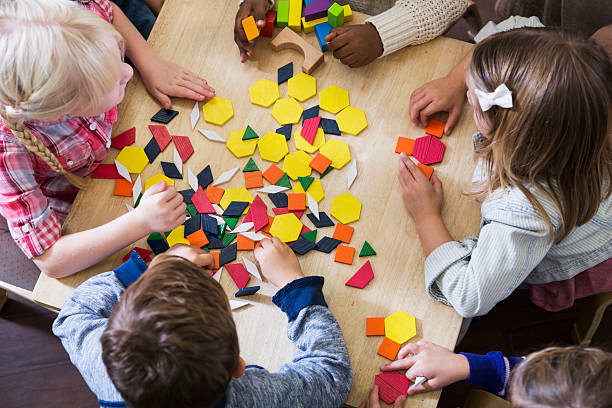In a world saturated with flashing lights and electronic noises, many parents are searching for a different kind of toy—one that doesn’t just pacify, but empowers. They are turning to the time-tested principles of Montessori education, which views play not as a distraction, but as the essential work of childhood. But what exactly sets Montessori toys apart, and why is their impact so profound on a child’s developing mind?
Montessori toys are not merely “educational”; they are purpose-built tools designed to align with a child’s natural developmental stages. They are characterized by being made from natural materials like wood, having a clear, self-correcting purpose, and isolating specific skills to master. Unlike toys that perform for a child, Montessori tools invite the child to act, think, and discover for themselves. This philosophy fosters not just academic readiness, but the very foundation of character: independence, concentration, and a lifelong love of learning.
The Core Principles of Montessori Play and Their Lasting Benefits
- Fostering Independence and Self-Correction: A key Montessori tenet is “help me to do it myself.” These toys are designed to be manipulated and mastered by a child’s own hands without constant adult intervention. They often have a built-in “control of error,” meaning the child can see and correct their own mistakes. This builds incredible resilience and self-reliance, as a child learns that struggle is part of learning and that they are capable of finding solutions.
- Developing Concrete Understanding: Before a child can grasp abstract symbols like numbers and letters, they must first understand what these concepts feel like. Montessori materials make the abstract tangible. A number isn’t just a squiggle; it’s a weight, a size, a countable object. This concrete experience builds a robust mental framework for all future academic learning.
- Refining Fine Motor Skills and Hand-Eye Coordination: From carefully grasping small objects to fitting pieces into precise slots, these toys demand focused physical engagement. This repetitive, purposeful work strengthens the small muscles in the hands and refines coordination, which is directly linked to later skills like writing, self-care, and tool use.
- Cultivating Concentration and Order: The minimalist, focused design of Montessori toys eliminates overstimulation, allowing a child to concentrate deeply on a single task. This practice in sustained focus is a critical skill in our distraction-filled world. Furthermore, the expectation of returning a material to its proper place fosters a sense of order and responsibility.
Bringing Montessori Home: The Woodemon Advantage
Understanding the theory is one thing; finding beautifully crafted, authentic Montessori toys for the home is another. This is where brands like Woodemon excel, translating core Montessori principles into durable, safe, and engaging products that parents can trust.
Let’s explore how two of their standout offerings—the Montessori Puzzles and the Math Calculator Toys—serve as perfect examples of this philosophy in action.
Woodemon Montessori Puzzles: The First Step to Independent Problem-Solving
Woodemon’s range of Montessori Puzzles, often featuring knobs and matching shapes or patterns, are a classic and essential developmental tool.
- Building Cognitive Foundations: These puzzles are a masterclass in problem-solving. A child isn’t just matching a shape; they are analyzing spatial relationships, comparing sizes, and using trial and error to find the correct orientation. This engages critical thinking and logical reasoning from a very young age.
- Refining the Senses and Motor Skills: The act of grasping the sturdy wooden knobs is a direct preparation for writing, developing the crucial pincer grip. The puzzles’ smooth, natural wood finish provides a rich tactile experience, connecting the child to the natural world. The self-correcting nature—where a piece only fits in its designated spot—gives the child immediate, non-verbal feedback, allowing them to work independently and build confidence with each successful placement.
Woodemon Math Calculator Toys: Making Abstract Numbers a Tangible Reality
Mathematics can be an intimidating world of symbols, but the Woodemon Math Calculator Toy changes the game entirely. This abacus-style tool transforms arithmetic from a mystery into a physical, manageable activity.
- From Concrete to Abstract: This toy is the perfect bridge between the physical and abstract worlds of math. A child can physically slide beads to represent the numbers 1, 2, or 10. They can see and feel what it means to “add” (grouping beads together) and “subtract” (separating them). This concrete experience prevents the common confusion children face when presented with only written equations, laying a solid, intuitive understanding of number sense and base-ten operations.
- Empowering the Young Mathematician: Using this “calculator” gives a child agency over math. They are not passively receiving information; they are actively building and deconstructing numbers. This hands-on exploration demystifies arithmetic and fosters a positive, “can-do” attitude towards mathematics—a gift that will benefit them throughout their entire academic journey. The satisfying tactile feedback of the wooden beads sliding on their rods makes the learning process both engaging and rewarding.
The Lasting Gift of Purposeful Play
Choosing a toy is more than a simple purchase; it’s a choice about the kind of play we value for our children. By opting for Montessori-inspired tools from brands like Woodemon, we choose play that respects the child’s innate drive to learn and grow.
These toys do not shout for attention; they quietly invite exploration. They don’t do the work for the child; they provide the tools for the child to do it themselves. In doing so, they build far more than academic skills—they build the confident, concentrated, and capable individuals our future needs. Invest in toys that do more than fill time; invest in toys that build minds.






